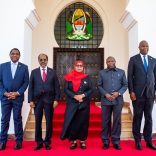Mozambique: President Chapo reaffirms cooperation commitment with Tanzania – Presidency
Mozambique: Assembly passes bill on state business sector – AIM report

File photo
The Mozambican parliament, the Assembly of the Republic, on Wednesday passed a government bill that establishes principles and rules for the entire state business sector.
The state business sector consists of public companies, which are 100 per cent owned by the state and, in principle, should only exist in strategic sectors, and a much larger number of “participated companies”, which are set up as limited companies under the Commercial Code, but in which the state is a shareholder.
The new law establishes a common legal framework for both forms of state property. All will have the same structure of a general meeting of shareholders that elects a board of directors, which then draws up the company’s plans and budgets, and also a three member Supervisory Board, including a certified auditor or accountant, which inspects and issues opinions on the company’s accounts.
All the companies must sign a contract-programme with the government, to guarantee coverage of the costs of any social component of the public service provided, which must be approved by the Minister of Finance. The contract-programme fixes the criteria for any subventions from the state budget.
All the companies are subject, not only to their internal controls, but to external audits, by independent auditors, and risk management. The financial controls must include an analysis of sustainability, and an assessment of the legality, efficiency and effectiveness of the company management, as well as measures to prevent and manage fiscal risk, and limits to indebtedness.
The acquisition of goods and services by the companies is governed by a set of principles including the pursuit of the public interest, transparency, publicity, competition and impartiality.
A set of regulations, putting flesh on the bare bones of this law, must be published within 180 days. All the existing companies then have a further 180 days to bring themselves into line with the provisions of the law and its regulations. This could be a serious headache for some of the participated companies, which are in deep financial trouble and may face liquidation.
The three security-related companies, Ematum (Mozambique Tuna Company), Proindicus and MAM (Mozambique Asset Management), which took over two billion dollars in illicit loans from European banks in 2013 and 2014, and are now effectively bankrupt, cannot continue in anything like their present state under the new law.
Indeed, it is more than likely that one of the reasons behind the new law is to ensure that no companies of the Ematum type can ever be set up again. Had the obligation for a Ministry of Finance sanctioned, and publicly available, contract-programme been in force in 2012-2013, the Ematum scandal would have been impossible.
The bill passed its first reading by 134 votes to 32. Deputies from the ruling Frelimo Party and from the Mozambique Democratic Movement (MDM) voted in favour, while the rebel movement Renamo voted against. This came as something of a surprise since Renamo deputies on the Assembly working commissions that analysed the bill had not spoken against it.
But in the Wednesday plenary session, Renamo deputy Jose Carlos Cruz called on the government to withdraw the bill, largely on the grounds that private companies are supposedly at a disadvantage in competing with state owned companies.
The MDM regarded the bill as a blow against Ematum, Proindicus and MAM. MDM deputy Armando Artur demanded that these three companies “should be regarded as illegal and their mentors jailed”.
The Assembly also passed the second and final reading of a government bill amending the 2007 law which set up the Financial Intelligence Office (GIFIM), in order to strengthen GIFIM’s anti-terrorist role.
The bill defines GIFIM’s task as to prevent the use of the Mozambican financial system, and any other sectors of economic activity, in money laundering, the financing of terrorism, and other organised transnational crime.
GIFIM must collect and analyse information on suspicious economic or financial operations that might indicate money laundering, the financing of terrorism or connected crimes, and collaborate with law enforcement agencies in identifying funds and assets resulting from transnational organised crime.
The Office must also monitor implementation of sanctions decreed by the United Nations Security Council. This has become particularly relevant in the light of recent claims that Mozambican entities are violating UN sanctions against North Korea.
When there is sufficient evidence of money laundering or financing of terrorism, GIFIM must immediately call on the Public Prosecutor’s Office to suspend the operations in question, and initiate criminal proceedings.
Both opposition parties continued to oppose the bill, arguing that GIFIM could not be independent if it was subordinate to the executive, and demanding that it be subordinate to the Assembly instead.
Mohamed Yassin of Renamo claimed “there’s a lack of political will to fight against corruption and money-laundering. We’re voting against because we don’t want to be held responsible for the incompetence of GIFIM and its future failure”.
Frelimo’s absolute majority in the Assembly ensured that the bill passed, by 123 votes to 45.












Leave a Reply
Be the First to Comment!
You must be logged in to post a comment.
You must be logged in to post a comment.